|
 Secure Site
Secure Site
|
 |
Archive for the 'Bamboo Chime Clocks' Category
 set your alarm to signal your body it's time to sleep Evening Ritual:
Use an evening alarm. “Set the Chime Alarm from Now & Zen, Inc. to remind you when it’s time to get ready for bed,” says Rubin Naiman, Ph.D., an assistant professor of medicine at the Arizona Center for Integrative Medicine, in Tucson, and the author of The Yoga of Sleep ($20, amazon.com). When the alarm sounds, start turning lights off around the house to let your body know it’s almost time to call it a night.
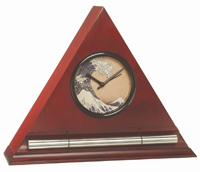 Soothing Chime Clock can be Used As a Evening Ritual Now & Zen Headquarter Store
1638 Pearl Street
Boulder, CO 80302
(800) 779-6383
Posted in Bamboo Chime Clocks, sleep, Sleep Habits
 Time your exercise each day and sleep better An early-evening workout may help you sleep. A study from Northwestern University, in Chicago, showed that insomniacs who did about 40 minutes of moderate cardio between 1 p.m. and 7 p.m. four times a week got an average of 75 more minutes of sleep a night. Set your Digital Zen Clock/Timer for at least 20 minutes. Choose an easy routine and finish two hours before bed, says Kori Malyszek, a coordinator for the Equinox Fitness Training Institute, in Los Angeles.
adapted from RealSimple.com
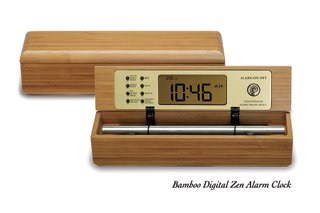 Bamboo Digital Zen Timer and Alarm Clock Now & Zen
1638 Pearl Street
Boulder, CO 80302
(800) 779-6383
Posted in Bamboo Chime Clocks, mindfulness practice, Now & Zen Alarm Clocks, Well-being
 Chime Alarm Clocks Contribute to Longer, Deep Sleep
Just the thought of Awaking to the Shrill Beeping Sound of An Alarm Clock Makes Me Want to Avoid Going to Sleep!
How can you solve your Alarm Clock Phobia? Try using Zen Clocks with exquisite sounds of Chimes and Singing-Bowls!
Our Zen Timepiece’s acoustic 6-inch brass bowl-gong clock is the world’s ultimate alarm clock, practice timer, and “mindfulness bell.”
It fills your environment with beautifully complex tones whenever it strikes. In the morning, its exquisite sounds summon your consciousness into awakening with a series of subtle gongs that provide an elegant beginning to your day. Once you experience the Zen Timepiece’s progressive awakening, you’ll never want to wake up any other way.
Our Zen Timepiece’s acoustic 6-inch brass bowl-gong alarm clock is the world’s ultimate alarm clock, practice timer, and “mindfulness bell.” It fills your environment with beautifully complex tones whenever it strikes. In the morning, its exquisite sounds summon your consciousness into awakening with a series of subtle gongs that provide an elegant beginning to your day.
Once you experience the Zen Timepiece’s progressive awakening, you’ll never want to wake up any other way.
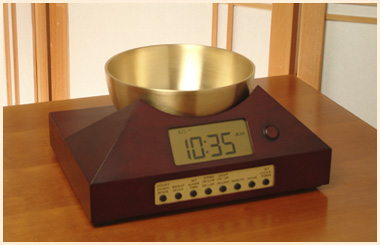 Zen Timepiece, Singing-Bowl Alarm Clock by Now & Zen Inc.
Now & Zen Headquarter Store
1638 Pearl Street
Boulder, CO 80302
(800) 779-6383
Posted in Bamboo Chime Clocks, Chime Alarm Clocks, sleep, Sleep Habits
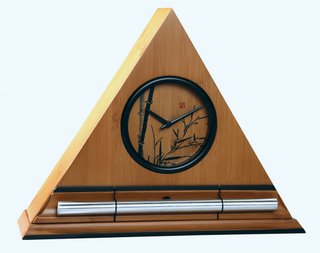 Bamboo Clocks Clocks As Learning Tools
It’s playtime―or is it cleanup time? Kids can master months of the year, days of the week, dates, and the concepts of a.m. and p.m. with a multipurpose clock and flip calendar on the wall.
 Kids meditation tools and timers Meditation Tools
The Digital Zen Clock also serves as a countdown and interval timer for yoga, meditation, bodywork, etc.; and it can also be set to chime on the hour as a tool for “mindfulness.”
Using a Singing Bowl Clock helps children time their meditation practice.
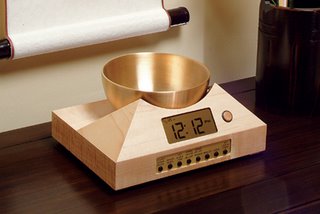 Clocks Can Be Used a Meditation Learning Tools for Children
Now & Zen
1638 Pearl Street
Boulder, CO 80302
(800) 779-6383
Posted in Bamboo Chime Clocks, wake up alarm clock, Zen Alarm Clock
Our Zen Timepiece’s acoustic 6-inch brass bowl-gong clock is the world’s ultimate alarm clock, practice timer, and “mindfulness bell.”
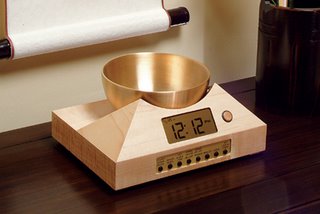 How to Decorate with Clocks
It fills your environment with beautifully complex tones whenever it strikes. In the morning, its exquisite sounds summon your consciousness into awakening with a series of subtle gongs that provide an elegant beginning to your day. Once you experience the Zen Timepiece’s progressive awakening, you’ll never want to wake up any other way. It also serves as the perfect meditation timer. Available in 5 wood styles.
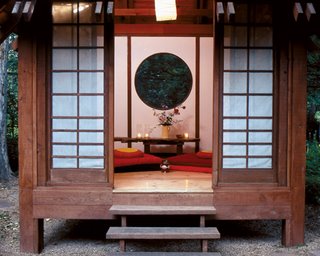 A Zen-like Clock helps Make Living Spaces More Zen Now & Zen Chime Clock Store
1638 Pearl Street
Boulder, CO 80302
(800) 779-6383
Posted in Bamboo Chime Clocks, Now & Zen Alarm Clocks, Well-being, Zen Alarm Clock
 progressive awakening Waking up in the morning is a metaphor for life — a kind of daily microcosmic reenactment of our overall purpose for being in the world. That is, just about every religious tradition emphasizes spiritual growth. And the connection between “awakening” and spiritual growth can be found in practically all forms of spiritual teaching.
So if waking up in the morning really is a metaphor for our larger spiritual lives, this perspective might help us treat our morning ritual of getting out of bed as a kind of spiritual practice. Indeed, when approached in this way, how we wake up in the morning can make a larger difference in our lives overall.
 waking up
Perhaps this is stretching the matter, but there are many people who do recognize that something as simple as waking up in the morning can be an authentic form of spiritual practice. For those who don’t have to go to work or get the kids to school, waking up naturally, whenever their body feels like it, can be a wonderful version of this practice. Waking up without an alarm, whenever your body has had enough rest, is probably the healthiest option, and the one that will leave us feeling most refreshed and ready to start the day.
However, there are few of us that have this luxury, especially during the week.
Fortunately, for those who want to wake up right, without being startled awake by an annoying alarm or some radio DJ, there is The Zen Alarm Clock. This clock was designed to make waking up a kind of spiritual practice.
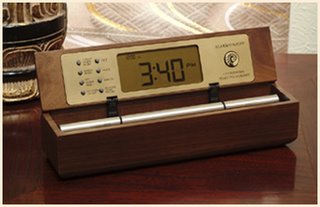 Digital Zen Alarm Clock
The Zen Clock wakes users with a built-in 10 minute gradual progression of acoustic chimes. And this gradual form of “progressive awakening” has been thoughtfully designed to include esoteric features that are fitting for a form of spiritual practice. For example, not only is the hardwood Zen Alarm Clock beautiful to see and hear, the clock’s chime is tuned to produce the same frequencies as the tuning forks used by musical therapists in their healing work. Moreover, the Zen Clock’s pre-programmed 10 minute chime progression sequence advances according to the “golden ratio,” which reflects both the natural proportions of our own bodies and the patterns of growth used in the overall evolution of the universe.
 love waking up with gentle chimes?
Even those who care little about such esoteric details nevertheless report that they love waking up with the gentle chimes of a Zen Alarm Clock. And as the makers of the Zen Alarm Clock hope, we may eventually come to see many of the simple details of our lives as forms of authentic spiritual practice.
Now & Zen Headquarter Store
1638 Pearl Street
Boulder, CO 80302
(800) 779-6383
Posted in Bamboo Chime Clocks, wake up alarm clock, Well-being, Zen Timepiece by Now & Zen
 energizing yoga It’s three o’clock, and despite your novel-length to-do list, the only thing that holds your attention longer than 30 seconds is the thought of a caffeine or sugar fix. You’d get a better and more sustained boost, though, by practicing a midday meditation.
Typically associated with relaxation, meditation also jump-starts energy and clears a foggy head, says Eric Harrison, director of Australia’s Perth Meditation Centre and author of “Flip the Switch: 40 Anytime, Anywhere Meditations in 5 Minutes or Less.” “If you meditate consciously and don’t succumb to sleep, your mind becomes calm and clear,” he explains. And unlike the usual drowsiness cures, a few minutes of meditation can keep you alert all afternoon.
One of Harrison’s favorite quick meditations involves tuning in to the sounds we generally try to ignore, which gives the chattering mind a chance to rest. So close your office door or find a quiet space and follow these easy steps — and that cafe run might soon be a thing of the past.
 yoga at work Listening Meditation
Clear a space. Set your Zen Meditation Timer for 5 minutes. Take a moment to remove some of the clutter in your immediate area — mugs, scattered pens, loose papers. This helps you transition into meditation mode and sets the stage for a calmer, more productive afternoon.
Log off. Turn off your computer and silence the ringers on your work and cell phones. This limits physical distractions while freeing up your mind to focus on listening.
Close your eyes and normalize your breathing. Sit up straight and take long, deep, deliberate inhalations, followed by even longer exhalations. Continue this breathing throughout the entire exercise.
Begin listening. Tune in to the sounds around you as if you were listening to music. Let your ears explore both background and foreground noises. Are there any sounds you can hear now that you didn’t before? What’s the most distant sound you can hear? What’s the closest? What music or harmonies do they create together?
Notice your mood. Suspend any judgments about the sounds that normally irritate you, like the hum of the copier, and just listen.
Check your body. Locate any tense feelings within, and concentrate on relaxing each one of them.
When you hear the Zen Meditation Timer Chime, after several minutes, open your eyes. Notice the difference in your energy level. If you’re still feeling groggy, distracted, or unfocused, continue the listening meditation for a minute or two more.
adapted from Body + Soul, June 2007 by Donna Garlough
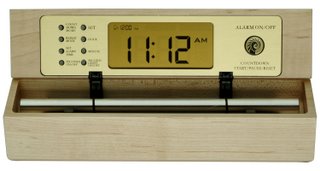 maple zen timer for meditation and yoga
Now & Zen
1638 Pearl Street
Boulder, CO 80302
(800) 779-6383
Posted in Bamboo Chime Clocks, intention, Meditation Timers, Meditation Tools, mindfulness practice, Now & Zen Alarm Clocks, Well-being
 meditation improves attention New research shows that meditation can help you improve your ability to concentrate in two ways. First, it can make you better at focusing on something specific while ignoring distractions. Second, it can make you more capable of noticing what is happening around you, giving you a fuller perspective on the present moment.
Some of the most fascinating research on how meditation affects attention is being conducted by Antoine Lutz, PhD, an associate scientist at the Waisman Laboratory for Brain Imaging and Behavior at the University of Wisconsin at Madison, in collaboration with Richard Davidson and the Laboratory for Affective Neuroscience at the University of Wisconsin. Their work has shown that concentration meditation, in which the meditator focuses complete attention on one thing, such as counting the breath or gazing at an object, activates regions of the brain that are critical for controlling attention. This is true even among novice meditators who receive only brief training. Experienced meditators show even stronger activation in these regions. This you would expect, if meditation trains the brain to pay attention. But extremely experienced meditators (who have more than 44,000 hours of meditation practice) show less activation in these regions, even though their performance on attention tasks is better. The explanation for this, in Lutz’s view, is that the meditation training can eventually help reduce the effort it takes to focus your attention. “This would be consistent with traditional accounts of progress in meditation practice. Sustaining focus becomes effortless,” Lutz says. This suggests that people can immediately enhance concentration by learning a simple meditation technique, and that practice creates even more progress.
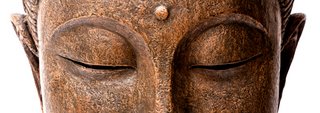 Buddha The researchers also looked at whether vipassana meditation training can improve overall attention. (Vipassana means “to see things as they really are,” and the meditation techniques are designed to increase focus, awareness, and insight.) Researchers label our inability to notice things in our environment as “attentional blink.” Most of us experience this throughout the day, when we become so caught up in our own thoughts that we miss what a friend says to us and have to ask her to repeat it. A more dramatic example would be a car accident caused by your thinking about a conversation you just had and not noticing that the car in front of you has stopped. If you were able to reduce your attentional blink, it would mean a more accurate and complete perception of reality—you would notice more and miss less.
To test whether meditation reduces attentional blink, participants had to notice two things occurring in rapid succession, less than a second apart. The findings, published in PLoS Biology, reveal that the meditation training improved the participants’ ability to notice both changes, with no loss in accuracy.
What explained this improvement? EEG recordings—which track patterns of electrical activity in the brain, showing precise moment-by-moment fluctuations in brain activation—showed that the participants allocated fewer brain resources to the task of noticing each target. In fact, the meditators spent less mental energy no-ticing the first target, which freed up mental bandwidth for noticing what came next. Paying attention literally became easier for the brain.
As a result, Lutz and his colleagues be-lieve that meditation may increase our control over our limited brain resources. To anyone who knows what it’s like to feel scattered or overwhelmed, this is an ap-pealing benefit indeed. Even though your attention is a limited resource, you can learn to do more with the mental energy you already have.
adapted from Yoga Journal, by Kelly McGonigal
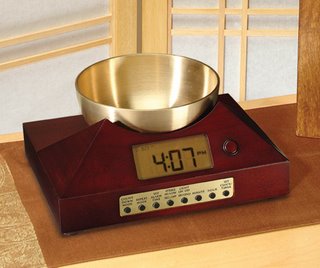 Zen Timepiece with brass singing bowl, a meditation timer Now & Zen
1638 Pearl Street
Boulder, CO 80302
(800) 779-6383
Posted in Bamboo Chime Clocks, intention, Meditation Timers, Meditation Tools, mindfulness practice, Now & Zen Alarm Clocks, Well-being, Yoga Timer
 Once you experience the Zen Timepiece's progressive tones, you'll never want to meditate any other way. A new study finds that people skilled at meditation seem able to turn off areas of the brain associated with daydreaming and psychiatric disorders such as autism and schizophrenia.
Learning more about how meditation works could help advance research into a number of diseases, according to lead author Dr. Judson Brewer, an assistant professor of psychiatry at Yale University.
He and his colleagues used functional MRI to assess brain activity in experienced and novice meditators as they performed three different meditation techniques.
Regardless of the type of meditation, skilled meditators had decreased activity in the brain’s default mode network, which has been linked to attention lapses and disorders such as anxiety, attention deficit hyperactivity disorder, and the buildup of beta amyloid plaques associated with Alzheimer’s disease.
The researchers also found that when the default mode network (which consists of the medial prefrontal and posterior cingulate cortex) was active, brain regions associated with self-monitoring and cognitive control were also activated in experienced meditators, but not novices.
This suggests that skilled meditators constantly monitor and suppress the emergence of “me” thoughts and mind wandering. If they become too strong, these two states of mind are associated with diseases such as autism and schizophrenia.
 Once you experience the Zen Timepiece's progressive tones, you'll never want to meditate any other way. The experienced meditators were able to co-activate the two brain regions both during meditation and while resting, which suggests they have developed a “new” default mode that’s more present-centered and less self-centered, the researchers said.
“Meditation’s ability to help people stay in the moment has been part of philosophical and contemplative practices for thousands of years,” Brewer said in a Yale news release. “Conversely, the hallmark of many forms of mental illness is a preoccupation with one’s own thoughts, a condition meditation seems to affect. This gives us some nice cues as to the neural mechanisms of how it might be working clinically.”
The study appears Nov. 21 in the Proceedings of the National Academy of Sciences.
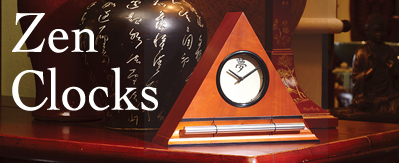 It's exquisite sounds summon your consciousness out of your meditative state with a series of subtle gongs. 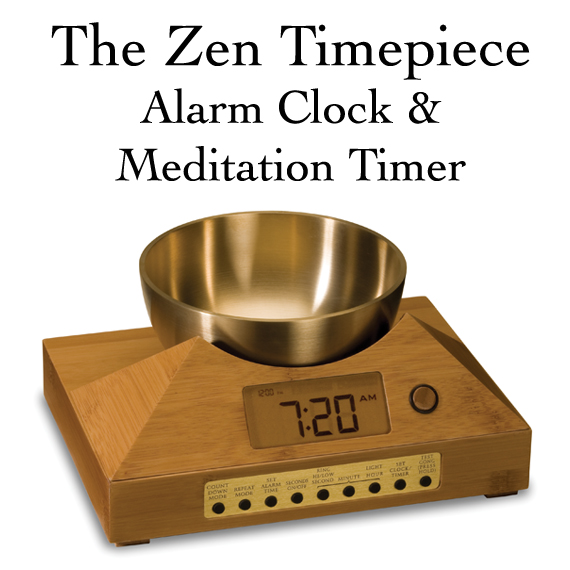 It's exquisite sounds summon your consciousness out of your meditative state with a series of subtle gongs. Now & Zen – Chime Meditation Timer Shop
1638 Pearl Street
Boulder, CO 80302
(800) 779-6383
orders@now-zen.com
Posted in Bamboo Chime Clocks
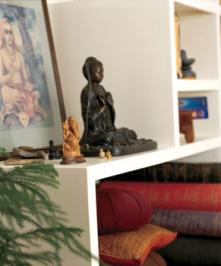 creating a meditation space in your home • It doesn’t really matter where your meditation space is located in your house, although Rodney Yee says the Balinese consider the northeast corner culturally and religiously auspicious. Tias Little likes the southeast corner because it captures morning light for early meditation. Basically, says Yee, pick a space where you feel relaxed and comfortable. “I think everybody has a special little place where they go to be quiet—just like a cat that searches until it finds the right spot to sleep.”
• You can think big thoughts in any size space. Your meditation area can be as expansive as Richard Freeman’s, a room “at the very top of the house, encompassed by a big maple tree,” or simply a spare closet or an empty corner. Rainbeau Mars likes a window for fresh air as long as it’s not distracting, but Little says a semi-enclosed space can give a “really spectacular feeling, like a little womb.” You might consider creating a six- or seven-foot-square adobe “cell” addition to your house or yard.
 meditation space • “Anyone can use [a meditation space], but only for meditation,” Deepak Chopra says. Freeman says to minimize distraction, you should choose a location that’s as isolated as possible from the traffic flow in your house, and it shouldn’t be in an area where you’re more tempted to sleep than meditate. If you share your space, each person should have his or her own chair, cushion, zabuton mat, or zafu pillow, “something that sanctifies this is my space,” Mars says. Sit on it only when you meditate. That helps create a ritual conducive to meditation, Judith Hanson Lasater says. It is nice to have a special Zen Meditation Timer on a table beside your the chair or cushion that you meditate on. This way you can easily reach the meditation timer to turn it off when it chimes and then you can continue to sit in peace until ready to move.
 Zen Timepiece, a brass singing bowl clock and timer • Tatami mats or bare wood floors are a better, cleaner option than rugs or carpets, and they create a more spacious feeling, Little says.
• An altar is a good idea. “When you set it up, the space begins to get that special feeling,” Yee says. An altar makes it clear the space is reserved for meditation and serves as a repository for your sacred objects and decorations. It needn’t be elaborate: Little has seen window sills used as altars. Yee’s altar is a small, low table covered with a Balinese cloth; Freeman’s is a stone slab.
• If you do yoga in your meditation space, store props such as mats, blocks, and straps in a chest. Leaving them out creates distracting clutter.
• Avoid bright overhead lighting, or use a dimmer switch. Lamps or sconces are best because they combine illumination with warmth.
• Include a timer. Meditation is all about discipline and consistency, and meditating a set amount of time each day can help achieve that, Lasater says. The Zen Timepiece chimes gently at the end of one’s meditation without startling one back to the here and now.
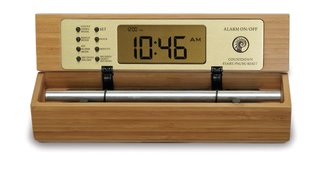 Bamboo Zen Meditation Timer • Even experts disagree on how to decorate your space. Most are minimalists. “It needs to be elegant in its simplicity and with very little clutter,” Chopra says. His recommended decorations include candles, books, and symbolic representations of archetypal figures such as gods, goddesses, angels, flowers, incense, and pastel colors. “You should not include anything that symbolically represents violence,” he adds. Yet not everyone finds minimalism calming, points out Freeman. “Some people display every saint they’ve ever heard of; some people may have only one. Others might light a candle; others prefer nothing. It’s whatever makes you want to sit there and do nothing.”
adapted from Natural Home Magazine, Jan/Feb 2005 by Vicky Uhland
Posted in Bamboo Chime Clocks, Japanese Inspired Zen Clocks, Meditation Timers, Meditation Tools, mindfulness practice, Well-being, Zen Timers
« Previous Page — « Previous Entries
Next Entries » — Next Page »
|
|
|
|